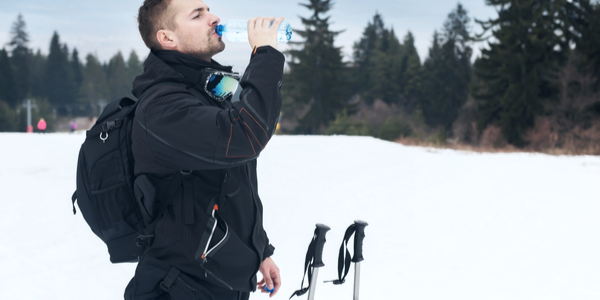
Wondering if winter dehydration is real? Winter hydration is just as important as summer dehydration.
From action-oriented winter sport seekers to those who like to celebrate the holidays inside their own homes, it is important to know how to hydrate quickly. Read on to learn how to get hydrated fast when the temperature drops.
What Is Dehydration?
Dehydration occurs when the body loses more fluids than consumed. The body needs a certain amount of water and other fluids in order to perform its normal, everyday functions.
The effects of mild to moderate dehydration can usually be reversed, but severe dehydration is capable of causing more permanent damage. Medical treatment becomes increasingly necessary the more severe the dehydration gets. While dehydration can happen to anyone at any age, it can be especially dangerous for children and the elderly.
Common Symptoms & Signs Of Dehydration
Being aware of the symptoms and signs of dehydration is an important step to spotting the signs. In children, vomiting and diarrhea are the most common symptoms of dehydration.
Other signs may include:
• Dry skin, mouth, or tongue
• Lack of tears when crying
• No wet diapers for three or more hours
• Sunken eyes, cheeks, or the soft spot at the top of the skull
• Irritability or listlessness
In adults, common signs and symptoms may include:
• Extreme thirst
• Headaches
• Craving chocolate, sugar, or other sweets
• Decreased frequency of urination
• Appearance of dark-colored urine
• Increased fatigue
• Dizziness or disorientation
• Feeling of confusion
Medical professionals should be contacted if the following serious symptoms occur:
• Diarrhea or vomiting lasts for 24 hours or more
• Irritability, disorientation, drowsiness, or abnormal inactivity that persists
• Bloody or black stool
• Chest or stomach pain
• Seizures
• Fainting
• Sluggishness or confusion
• Fever higher than 103°F
Does Cold Weather Cause Dehydration?
Some of the situations that occur in winter may increase the risk of dehydration. The following situations are just a couple of concerns to look out for.
Seasonal Depression
Seasonal affective disorder can cause a shift in normal habits. Activities such as staying hydrated and eating well can feel a lot harder than normal. It is important to address dehydration in order to support the treatment of seasonal depression as well.
Winter Sickness
With the changing of the seasons, one can be more susceptible to sickness. Sudden diarrhea or vomiting, sometimes called severe or acute, can cause significant loss of water, fluid, and electrolytes. When a lot of fluid and minerals are lost in a short amount of time, dehydration can occur.
Fever
Visiting with friends, family, or other loved ones can also increase the risk of infection. If a fever occurs, dehydration is more likely. Fever accompanied by diarrhea and vomiting can make the situation even worse.
Seasonal Sweating
Winter is often thought of as a cold season, but bundling up may cause excessive sweating. Sports or outdoor activities that occur in the winter also increase the risk of dehydration for those not watching their fluid intake.
Weather
In cold weather, extra water may be needed to offset the moisture loss that occurs in dry air. People living at higher altitudes may also need to consume more fluids in the winter.
Central air can also cause interiors to be drier in the winter. Even just water loss from breathing can be increased due to the methods used to keep modern residences warm.
Considerations For Older Adults
Older adults are especially susceptible to winter dehydration. Naturally, older adults have a lower volume of fluids in their bodies. They also are likely taking medications or have conditions that increase the risk of dehydration.
The elderly may also be immunocompromised. Even minor infections and illnesses can cause the risk of dehydration to increase. Conditions involving the lungs or bladder specifically can cause fluid levels in the body to change.
How To Prevent Dehydration
As the saying goes, "if you are feeling thirsty, it is too late." In other words, by the time the body sends clear signals that it needs fluids replenished, it’s probably already suffering from dehydration.
Luckily, there are a few easy tips to incorporate during winter in order to keep water intake up. Try these hacks for hydration!
Sip On Soup
Many fruits and vegetables are 80 to 90% water, or even more! Mixing fruits and vegetables in a soup can be extremely hydrating and comforting in the colder months. Be sure to avoid soups that are high in sodium since sodium can affect fluid retention in the body.
Extra hydrating fruits and veggies to include:
• Apples
• Celery
• Cucumber
• Lettuce
Do Not Let Temperature Determine Thirst
During the colder months, sometimes people forget to drink enough water. Without humidity or heat to prompt drinking fluids, it is easier to lose track of how hydrated an individual is. Be sure to keep fluid intake up instead of allowing the temperature outside to drive hydration levels.
Carry Water During Winter
Drinking water during winter, at least half of total body weight in fluid ounces each day, is a great way to avoid dehydration.
For example, an individual who weighs 150 pounds would need to drink at least 75 fluid ounces each day. Be sure to talk with a dietitian if there is any confusion on the amount of fluid to drink each day.
Having a water bottle or other hydrating fluid on hand helps to make hydration a habit. Be sure to hydrate with water first if possible, and avoid excessive alcohol or caffeinated drinks.
Enjoy Warm Drinks
Warm winter drinks can also be hydrating. Instead of sugar-laden, caffeinated, or alcoholic drinks, opt for more balanced alternatives. Herbal or cinnamon teas bring a great seasonal flair while also contributing to hydration levels.
Layer Clothes
Instead of heating up in bulky clothing, wear layers. Layered clothes allow for adjustable outfits. This helps to minimize water loss and keep clothing warm but not too hot.
The Last Word On Winter Dehydration
Summer gets most of the attention when it comes to hydration. However, winter dehydration has some warning signs to look out for.
A few easy habits can keep individuals healthy during the winter season (and entire year)!
References:
Are you drinking enough water during winter months? American Heart Association. Published December 19, 2019. https://www.heart.org/en/news/2019/12/19/are-you-drinking-enough-water-during-winter-months.
Bell A. Are you more dehydrated in the winter? Intermountain Healthcare. Published February 18, 2021. https://intermountainhealthcare.org/blogs/topics/live-well/2021/02/are-you-more-dehydrated-in-the-winter/.
Ellis E. Hydrate Right. Eat Right. Published December 8, 2020. https://www.eatright.org/fitness/sports-and-performance/hydrate-right/hydrate-right.







